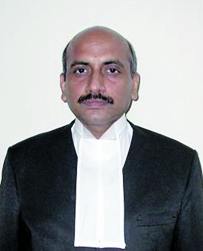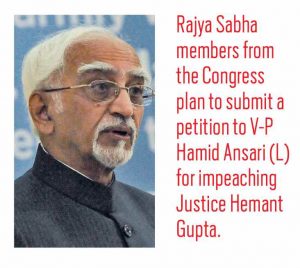Above: The Chief Justice of Madhya Pradesh High Court is under scanner for a money laundering case
Another legal eagle has come under the scanner for lowering the dignity of his office and trying to influence others. The Congress now wants to start impeachment proceedings against Justice Hemant Gupta
~By Rakesh Dixit in Bhopal
The chief justice of the Madhya Pradesh High Court, Justice Hemant Gupta, is under the scanner in a money laundering case and there are moves to impeach him. According to reports, Congress’ Rajya Sabha members are planning to submit a petition to the Upper House chairman, Hamid Ansari, for initiating an impeachment process against Justice Gupta. He is accused of trying to influence an Enforcement Directorate (ED) officer who was investigating a money laundering case against his wife and others.

The ED had sent a notice to Alka Gupta in November 2015 when she was a senior advocate in the Punjab and Haryana High Court. Her husband was at that time a judge in the same court. The ED notice, under Section 50 of the Prevention of Money Laundering Act, 2002, was also sent to Chetan Mittal, assistant solicitor general (ASG) based in Chandigarh. Both are learnt to have responded to the notices.
The ED also sent notices to others, including the ASG’s wife, Monika, and his advocate brother, who emerged as the main accused in investigation into a clutch of cases.
The ED investigation reportedly said that Alka Gupta had been “identified as associates and beneficiaries in the process of money-laundering through structuring of shell entities”. Justice Gupta courted controversy when he allegedly called up the-then investigating officer, Gopesh Byadwal, and asked him about the ongoing investigations into RMC Printers Pvt Ltd, a company where Alka was a director until June 27, 2009.
GROWING RESENTMENT
In May 2015, over 1,000 High Court advocates even sent a letter to President Pranab Mukherjee seeking the transfer and impeachment of Justice Hemant Gupta on these grounds. Letters were also sent to the prime minister, chief justice of India, Union law minister, acting chief justice of the Punjab and Haryana High Court and director of ED.
The letter read: “In view of the news item (HC judge called me about probe into firm linked to his wife: Enforcement officer) published in The Indian Express dated April 25, 2015, highlighting the impropriety of Hon’ble Justice Hemant Gupta for trying to interfere in the ED investigation against his wife, the need of the hour demands his transfer. Caesar’s wife may not be, but at least, Caesar must be above suspicion.”
Even as the controversy on the ED case was raging, the Supreme Court transferred Justice Gupta from Punjab and Haryana High Court to Patna High Court as acting chief justice in February 2016. He was among the nine names cleared by the Supreme Court collegium for appointment as chief justices of various high courts.
Justice Gupta was a judge in the Punjab and Haryana High Court from July 2, 2007 to February 8, 2016. On March 19, 2017, Justice Gupta took oath of office and secrecy as chief justice of the Madhya Pradesh High Court. He succeeded Justice AM Khanwilkar who was elevated to the Supreme Court.
DISPROPORTIONATE ASSETS
Hardly anyone in Madhya Pradesh, barring a few in the legal fraternity, is aware that the Campaign for Judicial Accountability and Reforms (CJAR) had in March 2017 written to the Supreme Court collegium seeking an in-house inquiry against Chief Justice Gupta over cases of alleged disproportionate assets and misbehaviour. There are reports that some top Congress leaders held a meeting with representatives of the CJAR.
 A resolution seeking judicial removal is being drafted by the Congress under Article 217(1)(b) of the constitution. As per the Judges Inquiry Act, 1968, a complaint against a judge has to be made through a resolution either by 100 members of the Lok Sabha or 50 Rajya Sabha members. After the MPs submit the motion, the presiding officer constitutes a three-member committee comprising two judges and a jurist to probe the complaint and determine if it is a case fit for initiating the impeachment process.
A resolution seeking judicial removal is being drafted by the Congress under Article 217(1)(b) of the constitution. As per the Judges Inquiry Act, 1968, a complaint against a judge has to be made through a resolution either by 100 members of the Lok Sabha or 50 Rajya Sabha members. After the MPs submit the motion, the presiding officer constitutes a three-member committee comprising two judges and a jurist to probe the complaint and determine if it is a case fit for initiating the impeachment process.
The move by the Congress should be viewed in the context of the disqualification of water resources and public relations minister Narottam Mishra by the Election Commission for not disclosing the poll expenditure he had incurred on paid news in the 2008 assembly election. Mishra had filed a petition in the Gwalior Bench of the MP High Court challenging his disqualification on June 30.
The petition was to come up for hearing on July 5, but owing to a lawyers’ strike, the matter was posted for hearing on July 10. Congress leaders were peeved that on July 5, the principal bench of the High Court in Jabalpur headed by the chief justice admitted a petition demanding that the assembly seat held by Mishra be declared vacant.
If the chief justice does get impeached, he will join a few others who have also found themselves in a similar predicament.


